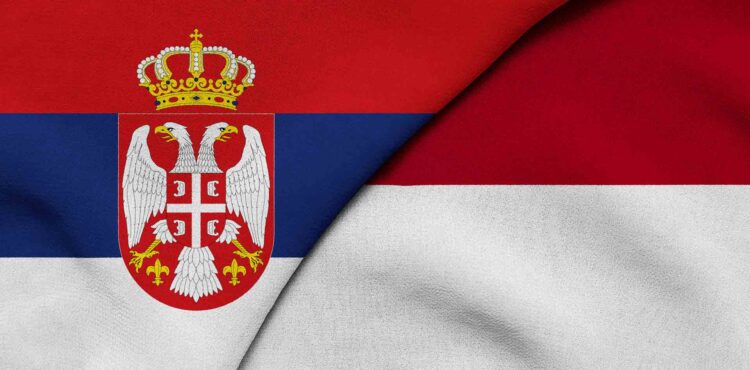Advisor to the President of the Republic of Indonesia Prof. Dr. Meutia Hatta Swasono visited Serbia
Ending her visit to Serbia, Prof. dr Meutia Hatta Swasono, a member of the Advisory Council for Education and Culture of the President of the Republic of Indonesia said: “What I have experienced in Belgrade these days is a divine gift”.
Dr Hatta, who celebrated her sixty-sixth birthday in Belgrade on March 21st, spoke at the reception organized at the residence of the Ambassador of Indonesia to Serbia HE Semuel Samson for the members of the Indonesian delegation.
During her visit Professor Hatta met with President of Serbia, Tomislav Nikolic. She also met with the ministers of health, culture and education Prof. Dr Slavica Djukic-Dejanovic, Bratislav Petkovic Msc and Prof. Dr Zarko Obradovic. She talked to the rector of the Belgrade University, Prof. Dr Vladimir Bumbasirevic, advisors to the President of the Republic of Serbia for protocol and media Jasmina Mitrovic Maric and Stanislava Pak Stankovic, as well as to the Acting Director of the Archives of Yugoslavia, Miladin Milosevic.
From 2004 to 2009, Dr. Hatta was the State Ministry for Women’s Empowerment in the first administration of the current President of Indonesia Yudhoyono. She is the eldest daughter of a respected “proponent” of the independence of Indonesia, Dr Mohammad Hatta (1902-1980), who, along with the first president of Indonesia Ahmed Sukarno (1901-1970), declared the liberation of Indonesia from Dutch colonial rule and Japanese occupation on August 17th 1945. Dr Mohammad Hatta was the first Vice President of Indonesia (1945 – 1956) and the third Prime Minister (1948 – 1950).
Hatta said to the employees of the Embassy of Indonesia, members of the Board of the Association of Serbian-Indonesian Friendship “Nusantara” and members of the Indonesian comunity living in Serbia that everything that was good between the former Yugoslavia and Indonesia, during their collaboration in the Non-Aligned Movement should be maintained and improved.
Also, she said that we should learn the lesson from the collapse of Yugoslavia and preserve Indonesian political, social and cultural model of the “unity in diversity”.
Ambassador Samson pointed out that it was the time of intense contacts between statesmen of Serbia and Indonesia. He recalled that it was during the visit of Hatta to Belgrade, that the President of the Serbian Assembly Nebojsa Stefanovic met with Indonesian parliamentary leaders and Indonesian Foreign Minister Marty Natalegawa in Jakarta. A few days ago, representatives of the delegation of the Yugoslav Archives and the National Archives of the Republic of Indonesia signed a memorandum on cooperation. Also, he said that, in the near future, we could expect new meetings of the officials of the two countries and expressed his belief that the bilateral relations between Serbia and Indonesia would continue to improve.
While in Belgrade, Dr. Hatta, who is the professor of anthropology at the University of Jakarta, also participated in two international conferences: one at the National Assembly, devoted to the status of women, and another at the Faculty of Philology dealing with the new cultural paradigm. This conference was organized by the Women’s Parliamentary Network. It was attended by the Minister of Energy Zoran Mihajlovic, the ministry of Health Prof. Dr Slavica Djukic-Dejanovic and Princess Katarina Karadjordjevic. The guests were addressed by Dr Alisa Maric, Minister of Youth and Sport who recalled a chess tournament in Jakarta, and the president of the Parliamentary Friendship Group with Indonesia, Aleksandra Tomic, member of the Serbian Progressive Party (SNS), which is the Chairperson of the Committee on the Economy, Regional Development, Trade, Tourism and Energy.
According to Dr. Hatta, government plays a very important role in improving the status of women who should be given the chance to fulfil their role as citizens of the state. “Women need to get a proper education, health care, and the ability and knowledge to get a job and earn a living, even if they are not the only breadwinner of the family”.
At the second conference in Belgrade, she advocated the preservation and development of the national culture successful national development, “in order to strengthen the honour and equal position among the nations“.
“Globalization is acceptable, but it should not undermine or distort the cultural system of unity, solidarity and brotherhood, humanity and social justice of the Indonesian people,” she concluded.
This was her second visit to Belgrade. First time she was in Belgrade in 1965 when her uncle, a retired admiral Subijato, was the Indonesian ambassador to Yugoslavia.
The Chairman of the Association Dr Aleksandar Rakovic, General Secretary Marko Jelic and Board Member Borislav Korkodelovic had the opportunity to introduce Dr Hatta to the activities of the Association of Serbian-Indonesian Friendship “Nusantara”.




